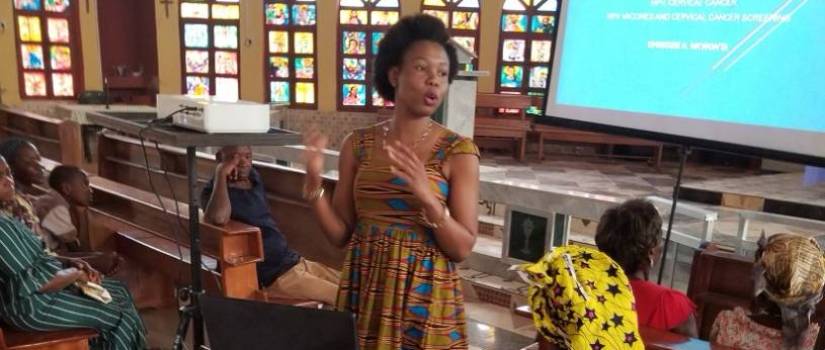Doctoral nursing and Women's and Gender Studies graduate student focuses on women's reproductive health in Nigeria
Before coming to the University of South Carolina to pursue her doctoral studies in the College of Nursing, Women’s and Gender Studies graduate certificate student Chigozie Nkwonta was a midwife in Nigeria. It was her experience caring for gynecological cancer patients as a young midwife that fueled her passion to study cervical cancer.
“The two leading causes of cancer death among women in Nigeria are breast cancer and cervical cancer," Nkwonta says. "Though preventable and easy to treat if detected early, the survival rate is very low in Nigeria. This is because most patients come in at an advanced stage.”
I can't talk about cervical cancer without talking about HPV, and vaccinations are essential in cervical cancer prevention.
As a doctoral student in nursing, Nkwonta has been focusing her research efforts on HPV and cervical cancer prevention through educational interventions to increase HPV vaccination and cervical cancer screening in Nigeria. “I can’t talk about cervical cancer without talking about HPV," Nkwonta says. "And vaccinations are essential in cervical cancer prevention. I am interested in prevention because coming from a poor resource country, it’s more effective and affordable than treatment.”
However, there are several barriers to HPV vaccination and cervical cancer screening efforts in the Nigerian context, including negative connotations and lack of male support. Nkwonta’s research focuses on involving men in an educational intervention to reduce some of those barriers.
“In the patriarchal and cultural environment like Nigeria, I believe women's and men's reproductive health should be seen as family health," Nkwonta says. "HPV affects the whole family; the impacts of HPV and cervical cancer affects both men and women physically, emotionally and financially.”
I look at socio-cultural factors that impact women's health, and Women's and Gender Studies helps me understand some of the issues that women and marginalized people face in different contexts around the world.
Nkwonta’s educational intervention research incorporates both men and women as participants. The complex gender dimensions of her research led her to pursue a graduate certificate in Women’s and Gender Studies in addition to her doctoral studies in nursing.
“I look at socio-cultural factors that impact women’s health and Women’s and Gender Studies helps me understand some of the issues that women and marginalized people face in different contexts around the world,” Nkwonta says.
Nkwonta recently completed a research trip to her field sites in Nigeria to collect data on educational intervention effectiveness for HPV vaccination and cervical cancer screening. During her research trip, she visited multiple field sites and included 281 participants in her study. Nkwonta’s trip was partly funded through the Harriot Hampton Faucette Award for Graduate Research from the Women’s and Gender Studies Program.
By Lorena Hildebrandt
Mar 1, 2018
